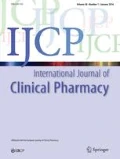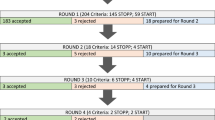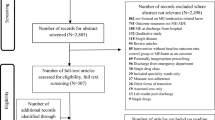Abstract
Objective The objective of this study was to investigate whether a Medication Report also can reduce the number of patients with clinical outcomes due to medication errors. Method A prospective intervention study with retrospective controls on patients at three departments at Lund University Hospital, Sweden that where transferred to primary care. The intervention group, where patients received a Medication Report at discharge, was compared with a control group with patients of the same age, who were not given a Medication Report when discharged from the same ward one year earlier. For patients with at least one medication error all contacts with hospital or primary care within 3 months after discharge were identified. For each contact it was evaluated whether this was caused by the medication error. We also compared medication errors that have been evaluated as high or moderate clinical risk with medication errors without clinical risk. Main outcome measures Need for medical care in hospital or primary care within three months after discharge from hospital. Medical care is readmission to hospital as well as visits of study population to primary and out-patient secondary health care. Results The use of Medication Report reduced the need for medical care due to medication errors. Of the patients with Medication Report 11 out of 248 (4.4%) needed medical care because of medication errors compared with 16 out of 179 (8.9%) of patients without Medication Report (p = 0.049). The use of a Medication Report significantly reduced the risk of any consequences due to medication errors, p = 0.0052. These consequences included probable and possible care due to medication error as well as administrative procedures (corrections) made by physicians in hospital or primary care. Conclusions The Medication Report seems to be an effective tool to decrease adverse clinical consequences when elderly patients are discharged from hospital care.

Similar content being viewed by others
References
Straand J, Rokstad KS. Elderly patients in general practice: diagnoses, drugs and inappropriate prescriptions. A report from the More & Romsdal Prescription Study. Fam Pract. 1999;4:380–8. doi:10.1093/fampra/16.4.380.
Hanlon JT, Lindblad CI, Hajjar ER, McCarthy TC. Update on drug-related problems in the elderly. Am J Geriatr Pharmacother. 2003;1:38–43. doi:10.1016/S1543-5946(03)80014-4.
Hepler CD, Strand LM. Opportunities and responsibilities in pharmaceutical care. Am J Hosp Pharm. 1990;3:533–43.
Leape LL. Preventing adverse drug events. Am J Health Syst Pharm. 1995;4:379–82.
Kwan Y, Fernandes OA, Nagge JJ, Wong GG, Huh JH, Hurn DA, et al. Pharmacist medication assessments in a surgical preadmission clinic. Arch Intern Med. 2007;10:1034–40. doi:10.1001/archinte.167.10.1034.
Bates DW, Boyle DL, Vander Vliet MB, Schneider J, Leape L. Relationship between medication errors and adverse drug events. J Gen Intern Med. 1995;4:199–205. doi:10.1007/BF02600255.
Haw C, Stubbs J, Dickens G. An observational study of medication administration errors in old-age psychiatric inpatients. Int J Qual Health Care. 2007;4:210–6. doi:10.1093/intqhc/mzm019.
Lisby M, Nielsen LP, Mainz J. Errors in the medication process: frequency, type, and potential clinical consequences. Int J Qual Health Care. 2005;1:15–22. doi:10.1093/intqhc/mzi015.
Williams EI, Fitton F. Factors affecting early unplanned readmission of elderly patients to hospital. BMJ. 1988;6651:784–7.
Glintborg B, Andersen SE, Dalhoff K. Insufficient communication about medication use at the interface between hospital and primary care. Qual Saf Health Care. 2007;1:34–9. doi:10.1136/qshc.2006.019828.
Midlov P, Bergkvist A, Bondesson A, Eriksson T, Hoglund P. Medication errors when transferring elderly patients between primary health care and hospital care. Pharm World Sci. 2005;27(2):116–20. doi:10.1007/s11096-004-3705-y.
Midlov P, Holmdahl L, Eriksson T, Bergkvist A, Ljungberg B, Widner H, et al. Medication report reduces number of medication errors when elderly patients are discharged from hospital. Pharm World Sci. 2008;30(1):92–8. doi:10.1007/s11096-007-9149-4.
Mjorndal T, Boman MD, Hagg S, Backstrom M, Wiholm BE, Wahlin A, et al. Adverse drug reactions as a cause for admissions to a department of internal medicine. Pharmacoepidemiol Drug Saf. 2002;1:65–72. doi:10.1002/pds.667.
The Uppsala Monitoring Centre. The use of the WHO-UMC system for standardised case causality assessment [homepage on the Internet]. [cited June 2008]; 2008. Available from: http://www.who-umc.org/graphics/4409.pdf
Bates DW, Spell N, Cullen DJ, Burdick E, Laird N, Petersen LA, et al. The costs of adverse drug events in hospitalized patients. Adverse Drug Events Prevention Study Group. JAMA. 1997;4:307–11. doi:10.1001/jama.277.4.307.
Classen DC, Pestotnik SL, Evans RS, Lloyd JF, Burke JP. Adverse drug events in hospitalized patients. Excess length of stay, extra costs, and attributable mortality. JAMA.. 1997;4:301–6. doi:10.1001/jama.277.4.301.
Kaushal R, Bates DW, Landrigan C, McKenna KJ, Clapp MD, Federico F, et al. Medication errors and adverse drug events in pediatric inpatients. JAMA. 2001;16:2114–20. doi:10.1001/jama.285.16.2114.
Al-Rashed SA, Wright DJ, Roebuck N, Sunter W, Chrystyn H. The value of inpatient pharmaceutical counselling to elderly patients prior to discharge. Br J Clin Pharmacol. 2002;6:657–64. doi:10.1046/j.1365-2125.2002.01707.x.
Vira T, Colquhoun M, Etchells E. Reconcilable differences: correcting medication errors at hospital admission and discharge. Qual Saf Health Care. 2006;2:122–6. doi:10.1136/qshc.2005.015347.
Gleason KM, Groszek JM, Sullivan C, Rooney D, Barnard C, Noskin GA. Reconciliation of discrepancies in medication histories and admission orders of newly hospitalized patients. Am J Health Syst Pharm. 2004;16:1689–95.
Acknowledgments
We thank the students Linda Andersson, Hanna Fredricson, and Nilla Swärdén for collecting all information on the patients’ drugs.
Funding
The department of Primary Care Development, The department of Research and Development in the county of Skåne, Apoteket AB and the Faculty of Medicine, Lund University.
Author information
Authors and Affiliations
Corresponding author
Rights and permissions
About this article
Cite this article
Midlöv, P., Deierborg, E., Holmdahl, L. et al. Clinical outcomes from the use of Medication Report when elderly patients are discharged from hospital. Pharm World Sci 30, 840–845 (2008). https://doi.org/10.1007/s11096-008-9236-1
Received:
Accepted:
Published:
Issue Date:
DOI: https://doi.org/10.1007/s11096-008-9236-1




